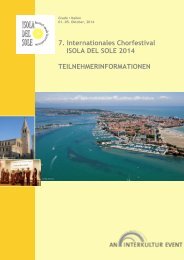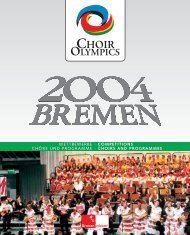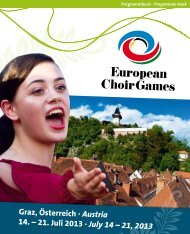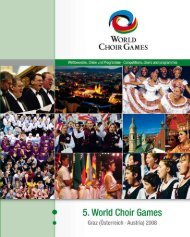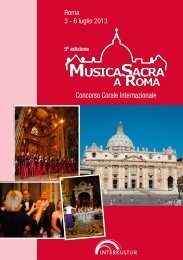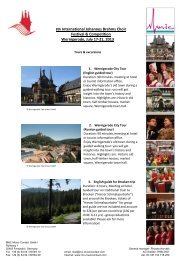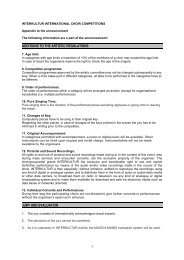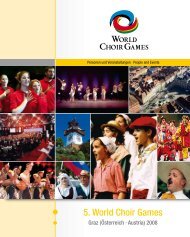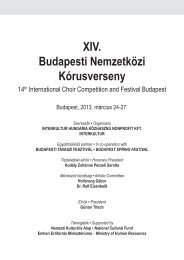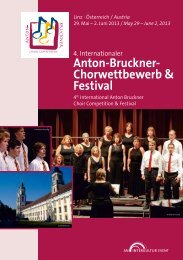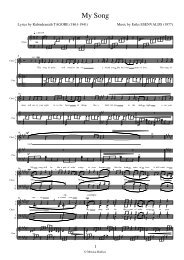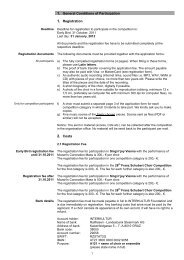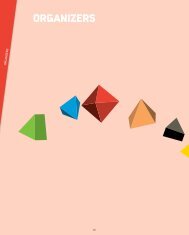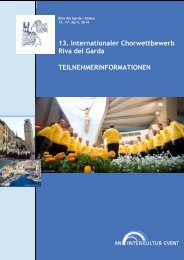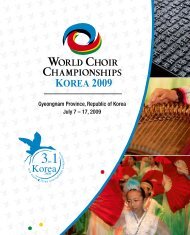Programme Brochure - interkultur.com
Programme Brochure - interkultur.com
Programme Brochure - interkultur.com
You also want an ePaper? Increase the reach of your titles
YUMPU automatically turns print PDFs into web optimized ePapers that Google loves.
design: manifest-by-design.<strong>com</strong> · EMAIL: INFO@MANIFEST-BY-DESIGN.COM · teL: +356 79056103
The Malta International<br />
Choir Competition<br />
& Festival<br />
Festival of Sacred & Secular Music<br />
29th October – 1st November 2009<br />
Organised by<br />
The Ministry of Education, Culture, Youth and Sport<br />
The Parliamentary Secretariat for Tourism<br />
The Malta Tourism Authority<br />
&<br />
INTERKULTUR Foundation (Germany)
contents<br />
maps of malta and valletta 5<br />
greetings by<br />
Gunter Titsch 7<br />
messages by<br />
Dolores Cristina 8<br />
— Minister of Education, Culture, Youth & Sport<br />
Mario de Marco 9<br />
— Parliamentary Secretary for Tourism<br />
organisers 10<br />
…connecting bridges 11<br />
artistic <strong>com</strong>mittee 13<br />
adjudicators 15<br />
programme 17<br />
3rd malta international choir <strong>com</strong>petition and festival<br />
<strong>com</strong>petition performance 23<br />
jury and evaluation 27<br />
participating choirs 29<br />
musical pieces<br />
laudate omnes gentes 35<br />
All Creatures of Our God and King 36<br />
See the conqu'ring hero <strong>com</strong>es 37<br />
Hallelujah 39<br />
choir singing in malta 45<br />
maltese culture 47<br />
musical calendar 48
6 th World Choir Games<br />
Shaoxing / Shanghai<br />
China · July 16 – 26, 2010<br />
You make it happen!<br />
Se<br />
y u<br />
yo<br />
S e yo<br />
Shanghai<br />
See you in Shaoxing and Shanghai!<br />
Offi cial partner for the World Choir Games 2010 Shaoxing<br />
Ask for special fl ight rates: mail@worldchoirgames.<strong>com</strong><br />
www.worldchoirgames.<strong>com</strong>
greetings by<br />
Günter Titsch – President <strong>interkultur</strong> Foundation<br />
On behalf of INTERKULTUR Foundation I<br />
wel<strong>com</strong>e you to the 3rd Malta International<br />
Competition and Festival. It is an honour for us<br />
that the Parliamentary Secretariat for Tourism, the<br />
Malta Tourism Authority, and the Ministry for<br />
Education, Culture, Youth and Sport support the<br />
festival and that the Maltese team has worked so<br />
hard to make the festival successful.<br />
Especially, I would like to mention the<br />
wonderful tradition that has been established<br />
during the festival to have the great ceremony<br />
“Singing for peace”. Representatives of the<br />
different churches and religions underline the<br />
importance of making bridges between nations<br />
and denominations. The theme “Singing for peace”<br />
adds wonderfully to the theme “Singing together<br />
brings nations together”. This motto has been the<br />
theme of all the INTERKULTUR festivals, especially<br />
the World Choir Games, the Olympics for Choirs, that<br />
have been organised by our foundation since the<br />
year 2000.<br />
There are so many wonderful ingredients in this<br />
festival – the <strong>com</strong>petitions, the grand concerts,<br />
the friendship concerts, the religious services,<br />
the workshops! All of them make the Malta<br />
International Choir Competition and Festival shine<br />
among the choral festivals of the world!<br />
7
messages by<br />
Dolores Cristina – Minister of Education, Culture, Youth and Sport<br />
The Malta International Choir Competition and<br />
Festival is one of a series of events that help to<br />
bring culture closer to the people.<br />
During the last days of October, Malta will be<br />
hosting 17 choirs from all over the world. Four<br />
other participating choirs will be from Malta.<br />
Although differing in style, they share a <strong>com</strong>mon<br />
feature, which entails singing with and for people,<br />
to build an atmosphere of happiness. In a healthy<br />
<strong>com</strong>petitive spirit, these choirs share a unique and<br />
enriching experience of sacred and secular music<br />
through the transmission of joy and peace. During<br />
these four days, we shall be seeing our capital city<br />
and its surroundings transformed into one big,<br />
colourful feast, synonymous with inter-culture and<br />
creativity.<br />
I would like to thank INTERKULTUR Foundation<br />
and the Parliamentary Secretariat for Tourism for<br />
their initiative and dedication into making this<br />
festive event possible. The Maltese nation deserves<br />
to be regaled with these activities promoting<br />
culture and participation.<br />
8
Mario de Marco – Parliamentary Secretary for Tourism<br />
various venues – both indoor as well as outdoor –<br />
whilst on Sunday morning the participating choirs<br />
will take part and sing in different churches all<br />
over Malta.<br />
The participating choirs and those<br />
ac<strong>com</strong>panying them have the opportunity to<br />
taste the diversity of our Islands, steeped in<br />
the immense cultural heritage, and most of all,<br />
experience the hospitality of our people.<br />
The organisation of the Malta International<br />
Choir Festival – first held in 1989 under the<br />
direction of the world renowned and beloved<br />
Maestro Charles Camilleri who died at the<br />
beginning of this year – is a concerted effort<br />
between the Ministry of Education, Culture,<br />
Youth and Sport; the Parliamentary Secretariat<br />
for Tourism; the Malta Tourism Authority and<br />
INTERKULTUR Foundation of Germany.<br />
This year’s festival – now in its 19th edition – is<br />
attracting 21 choirs from 10 countries, with over<br />
600 participants that will <strong>com</strong>pete and participate<br />
in different categories of sacred, secular and folk<br />
music. As in previous editions, we are taking<br />
the opportunity to have these choirs perform in<br />
Another important aspect of the Malta<br />
International Choir Festival is its contribution<br />
towards a closer tie of cultures between countries.<br />
It will also help Maltese choirs – this year four<br />
Maltese choirs are participating in the festival – to<br />
confront themselves with foreign choirs and thus,<br />
contributing towards the enhancement of Malta’s<br />
choral scene.<br />
This Festival is held in what is considered as a<br />
shoulder month for our tourism industry. Indeed,<br />
it is a sign of the <strong>com</strong>mitment by government and<br />
the Malta Tourism Authority to create events to<br />
enhance the experience and offer value added to<br />
those who choose to visit our Islands during this<br />
period of the calendar year.<br />
I would like to thank INTERKULTUR Foundation<br />
for their support in the organisation of this festival;<br />
as well as the Organising Team for this year’s<br />
edition, without whose energy and <strong>com</strong>mitment,<br />
this event would not have be<strong>com</strong>e a reality.<br />
9
organisers<br />
PRESIDENCY<br />
Günter Titsch<br />
ARTISTIC COMMITTEE<br />
Prof. Dr. Ralf Eisenbeiß – Germany<br />
Gábor Hollerung – Hungary<br />
Christian Ljunggren (leader) – Sweden<br />
Rev. John Galea – Malta<br />
THE ORGANISING TEAMS<br />
Interkultur TeaM<br />
Competition Office<br />
Piroska Horváth (H/D)<br />
Rossana Toesco (I)<br />
IT service/Data processing<br />
Ferenc Horváth (H)<br />
Technical Assistance<br />
Franco Attanasio (I)<br />
Ludmila Kovalenko (UA)<br />
Alessio Toesco (I)<br />
MALTA TEAM<br />
Peter Portelli: chairman<br />
Rev. John Galea: artistic director<br />
Doriana Bezzina, Ministry of Education, Culture, Youth & Sport<br />
Genevieve Abela, Parliamentary Secretariat for Tourism<br />
Martin Morana, Malta Tourism Authority: events co-ordinator<br />
Alexia Maggi, Malta Tourism Authority: hospitality co-ordinator<br />
Noel D’Amato, Malta Council for Culture and the Arts<br />
10
…connecting bridges<br />
T<br />
he First International Choir<br />
Competition of Budapest, which<br />
was launched in 1988, was the start<br />
of one of the largest and most<br />
successful series of cultural events in Europe.<br />
The name of these novel choir <strong>com</strong>petitions and<br />
festivals, MUSICA MUNDI, has since then be<strong>com</strong>e<br />
known throughout the world for its high artistic<br />
and organisational standards. It has be<strong>com</strong>e a<br />
concept for the choir-orientated public, with<br />
enthusiastic followers worldwide. These events<br />
are organized by the non-profit organisation<br />
INTERKULTUR Foundation. The Foundation’s<br />
biggest success so far, was to bring the antique<br />
Olympic idea to the choral world. The Choir<br />
Olympics 2000 in Linz (Austria) were the start of<br />
a Choir Olympic movement, which proved to be a<br />
success story that was continued in 2002, in Busan<br />
(Korea), 2204 in Bremen (Germany) and 2006 with<br />
the World Choir Games in Xiamen (China) and<br />
2008 in Graz (Austria).<br />
The Idea<br />
Meanwhile MUSICA MUNDI has be<strong>com</strong>e the<br />
symbol for a unique artistic idea, which consists of<br />
a new interpretation concerning the execution of<br />
choir Festivals. In <strong>com</strong>parison to the meritorious<br />
traditional choir <strong>com</strong>petitions, where only those<br />
choirs which belong to the international elite<br />
<strong>com</strong>pete, the MUSICA MUNDI <strong>com</strong>petitions are<br />
open for the first time to all choirs. Choirs from<br />
all over the world that are interested in gaining<br />
international festival and <strong>com</strong>petition experience<br />
can <strong>com</strong>pare themselves with other choirs<br />
according to their level of artistic achievement.<br />
The artistic <strong>com</strong>mittee of the foundation places<br />
emphasis on the presence of the highest level<br />
of choral performers as well as on the presence<br />
of the greatest diversity of choral performers in<br />
all <strong>com</strong>petitions. This new type of <strong>com</strong>petition<br />
has been copied by numerous newly launched<br />
<strong>com</strong>petitions in the last few years. With the idea to<br />
organize the Choir Olympics biennial, INTERKULTUR<br />
Foundation has opened a door to new impulses<br />
and perspectives for the national and international<br />
choral movement.<br />
The Pedagogical Concept<br />
The INTERKULTUR events are not just<br />
<strong>com</strong>petitions and international choir festivals,<br />
they gain their <strong>com</strong>petence and lasting effect on<br />
its participants more and more by pedagogical<br />
offers. In consultation rounds, for example, the<br />
choirs have the chance to work together with the<br />
international jury. They get advice on their current<br />
level of performance, <strong>com</strong>petent pedagogical<br />
and artistic information and suggestions as to<br />
how to interpret the chosen piece. In connection<br />
with those conventions, seminars for conductors,<br />
<strong>com</strong>poser portraits and lectures are offered at the<br />
INTERKULTUR events. Friendship and encounter<br />
concerts reinforce this big emotional effect of<br />
the international choir-meetings organized by<br />
INTERKULTUR Foundation.<br />
11
The Competitions<br />
There are various categories for all choir types<br />
and choir levels in different degrees of <strong>com</strong>petence,<br />
with and without <strong>com</strong>pulsory pieces. They offer a<br />
unique atmosphere, good <strong>com</strong>petitive conditions,<br />
intensive artistic contacts, various consultation<br />
programmes and workshops, as well as practice<br />
opportunities with international performers. More<br />
than 200 experts and leading choirmasters from all<br />
over the world guarantee a high level of qualified<br />
<strong>com</strong>petence in all INTERKULTUR events.<br />
The Participants<br />
In total, 5,000 choirs with 230,000 active<br />
singers from 100 countries have taken part in the<br />
INTERKULTUR <strong>com</strong>petitions to date. It is interesting<br />
to note that over half of the participants have been<br />
children and young choristers of under 25 years of<br />
age.<br />
INTERKULTUR Foundation is member of the<br />
German UNESCO Commission<br />
Locations of Festivals and Competitions<br />
So far INTERKULTUR events have been taking<br />
place in various countries all over the world,<br />
namely, in the People’s Republic of China, Austria,<br />
Czech Republic, Germany, Hungary, Israel, Italy,<br />
Malta, Republic of Korea, Sweden and USA.<br />
12
artistic <strong>com</strong>mittee<br />
Christian Ljunggren (Sweden)<br />
Christian Ljunggren was born in 1942. He<br />
studied music at the Royal Academy of Music in<br />
Stockholm as well as musicology and theology<br />
at the University of Uppsala. For many years he<br />
worked at the Music Department of the Swedish<br />
National Broadcasting Comp., responsible for<br />
presentation and programmes on music. He is the<br />
conductor of the Nicolai Chamber Choir since<br />
its inception in 1974. He was the president of the<br />
KÖRSAM, the joint <strong>com</strong>mittee of the Swedish choral<br />
organisations from 1997-2004. He was the secretary<br />
general of IFCM, the International Federation for<br />
Choral Music, in between 1997 and 1999. He is<br />
one of the artistic directors of INTERKULTUR as<br />
well as artistic director of the World Choir Games.<br />
He is the leader of the Malta International Choir<br />
Festival.<br />
Prof. Dr. Ralf Eisenbeiß (Germany)<br />
Ralf Eisenbeiβ was born in 1952. He studied<br />
pedagogy, German philology and musical<br />
education and received his doctorate in 1979.<br />
He was appointed professor in the Franz Liszt<br />
Conservatory in Weimar in 1987. He was also<br />
lecturer at the central seminar for choral conductors<br />
in Berlin. His renowned Pedagogical University<br />
Zwickau Choir toured many countries. He often<br />
appears as guest conductor both in Germany as<br />
well as abroad. Ralf Eisenbeiβ is one of the artistic<br />
directors of INTERKULTUR Foundation as well as<br />
artistic director in the World Choir Games.<br />
13
Gábor Hollerung (Hungary)<br />
Gábor Hollerung was born in Budapest in<br />
1954. He studied at the Liszt Academy of Music.<br />
He has been the principal conductor of the<br />
Dohnányi Symphony Orchestra Budafolk since<br />
1989. He is also the music director of the Budapest<br />
Academic Choral Society since 1980. Since 2001<br />
he is the music director of Honvéd Ensemble<br />
and conductor of its professional male choir. In<br />
2002 he became principal guest conductor of<br />
the Jerusalem Symphony Orchestra and musical<br />
advisor of the Philharmonic Singers Tel Aviv. In<br />
2002 he was awarded the Knights’ Cross Order of<br />
the Hungarian Republic and in 2004 he received<br />
the Liszt Prize.<br />
Rev. John Galea (Malta)<br />
Rev. John Galea received his musical education<br />
at the Seminary and later with private tutors. He<br />
attended Master classes in orchestral practice<br />
and conducting in Vienna and at the Accademia<br />
Chigiana in Siena. Between 1965 and 2000, he<br />
directed the St. Julian’s Choir. In 1990 he was<br />
nominated Musical Director of the Cappella<br />
Diacono whose main activity is the performance of<br />
the liturgical music <strong>com</strong>posed by Carlo Diacono.<br />
Between 1993 and 2000 he served as Maestro di<br />
Cappella of the Metropolitan Cathedral and set up<br />
the Cappella Cathedralis choir to perform during<br />
the principal liturgical feasts at Mdina Cathedral<br />
and St. John’s Co-Cathedral. During these last<br />
years he was entrusted with the APS Bank project<br />
for the realization, editing and performance of<br />
religious music by Maltese <strong>com</strong>posers, which was<br />
also published in a series of CDs.<br />
14
adjudicators<br />
Chris Muscat<br />
First prize winner of the Joyce Dixey (UK) and<br />
the Jaume Dotras Serrabella (Spain) <strong>com</strong>position<br />
<strong>com</strong>petitions, Christopher Muscat studied<br />
<strong>com</strong>position and conducting at the Universities of<br />
Malta and Surrey, where he earned his Master of<br />
Music degree with distinction. His <strong>com</strong>positions<br />
have been performed in many important European<br />
centres including the prestigious Berliner<br />
Philharmonie. As a conductor Muscat regularly<br />
conducts ensembles and orchestras in Malta and<br />
abroad and is equally at home in both the standard<br />
and the contemporary repertoires. Muscat has<br />
been a visiting lecturer in music at the University<br />
of Malta since 2003 and was invited to sit as<br />
juror on various national and international music<br />
<strong>com</strong>petitions. He is also very much involved in the<br />
field of sacred music and is the Music Director of<br />
the Jubilate Deo Choir.<br />
André de Quadros<br />
André de Quadros is a professor of music at<br />
Boston University where he has affiliated faculty<br />
appointments at: the African Studies Center, the<br />
Center for the Study of Asia, and the Institute for<br />
the Study of Muslimic Societies and Civilizations.<br />
He is the editor of numerous choral publications,<br />
namely: Cantemus; Music of Asia and the Pacific; and<br />
Salamu Aleikum: Choral Music of the Muslim World<br />
published by Earthsongs; and Songs of the World<br />
published by Hinshaw Music. His edited volume<br />
Spice, Magic and Mystique: Choral Music of Southeast<br />
and others (Germany). He is the conductor of the<br />
Manado State University Choir. He is the artistic<br />
director of the Tomohon International Choir<br />
Competition and of Aswatuna – Arab Choral<br />
Festival. As a conductor, speaker, clinician and<br />
scholar, he has presented, produced, performed,<br />
taught and undertaken fieldwork in over 30<br />
countries.<br />
Volker Hempfling<br />
Volker Hempfling studied church music, organ,<br />
orchestral direction and singing. He worked as<br />
choirmaster, organist and director of sacred music<br />
at the cathedral of Altenberg from 1972 to 1985.<br />
He has also worked as director of church music<br />
and director of the cathedral choir from 1972 to<br />
1997. In 1968 he founded the well known Kölner<br />
Kantorei in Cologne. Both choirs went on concert<br />
tours to numerous countries. In 1983 Volker<br />
Hempfling became director of the choir Gürzenich<br />
in Cologne. In 1985 he was offered a professorship<br />
at the music college of the Saarland, Germany. As<br />
professor for choral conducting he was responsible<br />
for the Department of Protestant Church Music<br />
15
and worked as director of the chamber choir from<br />
1993 to 2004. He was invited as guest conductor<br />
in Germany and abroad and gave conducting<br />
and voice training courses in many countries. He<br />
is also in great demand as juror at national and<br />
international <strong>com</strong>petitions.<br />
Battista Pradal<br />
Battista Pradal (1964) attended B. Marcello and<br />
J. Tomadini conservatories in Venice and Udine<br />
and obtained diplomas in <strong>com</strong>position, piano<br />
and choral music and choir conducting. He has<br />
been awarded prizes at important national and<br />
international <strong>com</strong>position <strong>com</strong>petitions. The CIDIM,<br />
National Committee Italian Music, has included<br />
him amongst other Italian <strong>com</strong>posers in PODIUM<br />
project. He studied orchestra conducting under<br />
R. Gessi at the European Academy in Vicenza.<br />
In 2001 he established the choir and orchestra In<br />
Musica Gaudium – an ensemble of young students<br />
and musicians – in Oderzo, Treviso. Battista Pradal<br />
is teacher of piano, <strong>com</strong>position and harmony at<br />
the music school Orpitergium in Oderzo, Treviso<br />
and at the musical foundation Santa Cecilia in<br />
Portogruaro near Venice. Many of his pieces were<br />
performed in Italy and in other countries, several<br />
of which are published in some CD <strong>com</strong>pilations.<br />
He was member of the jury in international<br />
<strong>com</strong>position and choral <strong>com</strong>petitions.<br />
Cecilia Xuereb nee Gouder<br />
Cecilia Xuereb nee Gouder, B.A., L.P., L.R.S.M.,<br />
Dip. In Educ. Man., studied piano with Bice<br />
Mizzi-Vassallo, Bice Bisazza and Anna Maria<br />
Scicluna Bisazza and harmony with Carmelo Pace.<br />
She obtained her Licentiate from the Royal School<br />
of Music, London in 1959. For the past thirty years<br />
Cecilia Xuereb has been the chief music critic for<br />
The Sunday Times of Malta. She has also contributed<br />
several articles on the music scene in Malta for<br />
various publications including several editions of<br />
The Malta Year Book and Treasures of Malta. For<br />
several years she was a member of the Chorus<br />
Melitensis and of the Malta Choral Society. On a<br />
number of occasions she has acted as adjudicator<br />
in music <strong>com</strong>petitions in Malta. She was also<br />
responsible for setting up and organizing a music<br />
<strong>com</strong>petition for the National Council of Women<br />
which this year has reached its 12th edition.<br />
She graduated from the University of Malta<br />
and taught for many years both in state schools at<br />
sixth form level and later in church schools, where<br />
she introduced music as a subject on the school<br />
curriculum.<br />
16
programme<br />
EVENTS PROGRAMME – OVERVIEW<br />
3rd Malta International Choir<br />
Competition and Festival<br />
Thursday, 29th October<br />
18:30 Valletta, City Gate – Participating Choirs parade along Republic Street.<br />
19:00 Grand Master's Palace Courtyard - Opening ceremony<br />
Participation by Nafra ethnic band and various choirs.<br />
Friday, 30th October<br />
09:00-13:00 Floriana, St. Publius Church – Sacred Music Competition<br />
12:00 Valletta, St. John’s Square – Open Air Friendship concert by various choirs<br />
12:30 Valletta, Upper Barrakka Garden – Open Air Friendship concert by various choirs<br />
15:30 Meditteranean Conference Centre, Valletta – Workshops with Andre de Quadros and<br />
Volker Hempfling<br />
19:30 Mediterranean Conference Centre, Valletta – Grand Concert:<br />
Excerpts from Mendelssohn’s oratorio “Paulus” by “Jubal Orchestra” and selected choirs. The<br />
programme also features excerpts from Haydn’s oratorio “The Creation” and Händel’s serenata “Acis<br />
and Galatea”. The “Hallelujah” chorus from Händel’s “Messiah”, sung by all Festival choirs together,<br />
concludes this concert.<br />
Saturday, 31st October<br />
09:00-13:00 Floriana, Catholic Institute – Competition of secular, folk and pop categories<br />
12:00 Valletta, St. John’s Square – Open air Friendship Concert by various choirs<br />
20:00 Valletta, St. John’s Co-Cathedral – Singing Together for Peace<br />
An inter-religious meeting with the participation of choirs and representatives of various religious<br />
denominations and faiths.<br />
21:00 Sagrestia Vault, Valletta Waterfront – Concert by Viva Female Choir from Norway and<br />
Nicolai Chamber Choir from Sweden<br />
Sunday, 1st November<br />
Morning: Various churches in Malta – Participation of choirs during mass.<br />
11:00 Salesian Theatre, Sliema – Friendship concert by Collegium Vocale, Norway and<br />
Nicolai Chamber Choir, Sweden<br />
17:30 Catholic Institute, Floriana – Closing concert and prize giving ceremony.<br />
17
EVENTS PROGRAMME – IN DETAIL<br />
THURSDAY, OCTOBER 29 – OPENING CEREMONY<br />
18:00 Choristers and organizers meet at City Gate Valletta – Walk down Republic Street to the<br />
President’s Palace.<br />
19:00 Opening Ceremony at President’s Palace Courtyard, Valletta<br />
the chamber choir “Amadeus”, Latvia – (conductor : Inga Dziluma) Latvian Folk Songs<br />
Wel<strong>com</strong>e by<br />
Christian Ljunggren, artistic director, INTERKULTUR<br />
Rev. John Galea, Malta’s festival team artistic director.<br />
Zenska Klapa “Teranke”, Croatia – (conductor: Tatjana Merkl) “Golubice nemoj” Folk song<br />
(arr. E. Tudor) and “Cetina” by D. Žanko (arr. M. Čačija)<br />
stockholms Studentsångarförbund, Sweden – (conductor: Jerica Greorc Bukovec) Hugo<br />
Alfvén “Gryning vid havet”<br />
Musical Performance by Nafra – a Maltese ethnic Band.<br />
address by<br />
The Hon. Dr. Mario de Marco, Parliamentary Secretary for Tourism.<br />
The Hon. Dolores Cristina, Minister for Education, Culture, Youth and Sport<br />
Compere: Joyce Guillaumier<br />
about Nafra<br />
Nafra is a Maltese band that makes use of traditional folk instruments and musical scores integrated<br />
with some more contemporary sounds. Many of the ensemble’s eclectic instruments were created by ∑<br />
Ġużi Gatt, using animal horns and skins, various types of wood and even earthenware. Nafra, led<br />
by Ruben Zahra, is an acoustic ensemble featuring traditional Maltese instruments, namely the<br />
żaqq (bagpipe), żummara (reed pipe), flejguta (cane flute), żafżafa (friction drum) and tanbur<br />
(frame drum). Nafra is very active not only on the local scene but also abroad, having been invited<br />
to perform in Portugal, Spain, Germany, Tunisia and Hong Kong.<br />
18
EVENTS PROGRAMME – IN DETAIL<br />
Friday October 30 – Grand Concert Celebrating Mendelssohn Bartholdy, Händel and Haydn<br />
19:30 Mediterranean Conference Centre, Valletta<br />
Felix Mendelssohn Bartholdy (1809-1847)<br />
from the oratorio “Paulus”<br />
1. Overture<br />
2. Choir: Thou alone art God<br />
3. Choral: To God on high<br />
4. Aria (soprano): Jerusalem<br />
5. Choir: Happy and blest<br />
6. Recitative and female choir: Saul, Saul<br />
7. Choir: Rise up arise<br />
8. Choral: Sleepers wake<br />
9. Choir: O great is the depth<br />
St. Monica Choir, Malta; Nicolai Kammarkör, Sweden; Stockholms Studentsångare, Sweden;<br />
Magnificat, Hungary; Collegium Vocale, Norway; Journey Choir, Malta.<br />
Soloists: Ruth Sammut Casingena (Soprano), Joseph Aquilina (Tenor), Anthony Montebello (Bass)<br />
Orchestra: The Jubal Orchestra. Conductor: Rev. John Galea.<br />
interVAL<br />
Georg Friedrich Händel (1685-1759)<br />
the Conquering Hero Comes from “Judas Maccabeus”<br />
All choirs<br />
Orchestra: The Jubal Orchestra. Conductor: Christian Ljunggren<br />
From the serenata “Acis and Galatea”<br />
1. Choir: O the pleasure of the plains<br />
2. Choir and bass solo: The flocks shall leave the mountain<br />
3. Choir: Happy, happy, we<br />
Choir: Nicolai Kammarkör, Sweden<br />
Bass solo: Anthony Montebello<br />
Orchestra: The Jubal Orchestra. Conductor: Christian Ljunggren<br />
19
EVENTS PROGRAMME – IN DETAIL<br />
Felix Mendelssohn Bartholdy<br />
richte mich Gott<br />
Choir: Collegium Vocale, Norway. Conductor: Thomas Caplin<br />
Veni Domine<br />
Choir: Magnificat, Hungary. Conductor: Valéria Szebellédi<br />
From “Sechs Sprüche” op. 79<br />
Choir: Maulbronner Kammerchor, Germany. Conductor: Jürgen Budday<br />
herr sei gnädig, op. 116<br />
Choir: Coro Universitario de Valladolid, Spain. Conductor: Marcos Castan<br />
Joseph Haydn (1732-1809)<br />
the Heavens Are Telling from “The Creation”<br />
Soloists: Ruth Sammut Casingena (soprano), Joseph Aquilina (tenor), Anthony Montebello (bass)<br />
Choirs: St. Paul Choral Society, Malta, Maulbronner Kammerchor, Germany<br />
Georg Friedrich Händel<br />
Zadoc the priest, coronation anthem<br />
Soloists: Ruth Sammut Casingena (soprano), Joseph Aquilina (tenor), Anthony Montebello (bass)<br />
Choirs: St. Paul Choral Society, Malta, Maulbronner Kammerchor, Germany<br />
“Alleluja Chorus” from “Messiah”<br />
All choirs<br />
Orchestra: The Jubal Orchestra. Conductor: Christian Ljunggren<br />
Compere: Joyce Guillaumier<br />
20
EVENTS PROGRAMME – IN DETAIL<br />
Saturday October 31 – SINGING TOGETHER FOR PEACE<br />
20:00 St. John’s Co-Cathedral<br />
hymn: Laudate omnes gentes (Taizé).<br />
Joint choirs from the festival. Conductor: Christian Ljunggren<br />
Wel<strong>com</strong>e by His Lordship Mgr Mario Grech, Bishop of Gozo<br />
“Choral improvisation”<br />
Joint choirs from the festival. Conductor: Volker Hempfling<br />
Ms Wiebke Micallef Eynaud, representative of the Catholic Church<br />
ola Gjeilo: “Unicornis Captivatur”<br />
Choir: Sola Fide, Norway. Conductor: Janicke Damm Rusti<br />
Rev Can. Simon Godfrey, representative of the Anglican Church<br />
Vladimir Milosavljevic: “Pokajnicka molitva”<br />
Choir: Mixed Choir Jedinsko, Bosnia & Herzegovina. Conductor: Nemanja Savic<br />
Mgr George Mifsud, representative of the Eastern Churches<br />
Pavel Cesnokov: “Sovjet Prevjecnu”<br />
Choir: Drústavo pevski zbor SREĈKO KOSOVEL Ajdovščina, Slovenia.<br />
Conductor: Matjaž Šček<br />
hymn: All Creatures of Our God and King<br />
Joint choirs from the festival. Conductor: Rev John Galea<br />
Pastor Wilfred Steen, representative of the German Evangelical Church<br />
eve & Austrina: “Laudamus in Domino”<br />
Choir: Venda, Latvia. Conductor: Anitra Niedre<br />
Ms. Shelly Tayar, representative of the Jewish faith<br />
edward Grieg: “Ave Maris Stella”<br />
Choirs: Kammerkoret Collegium Vocale, Norway; Nicolai Kammakör, Sweden.<br />
Conductor: Thomas Caplin<br />
Mr Mohammed el Sadi, representative of Islam<br />
rodolfo Delarmente: “Dumbele”, Philippines<br />
Joint choirs from the festival. Conductor: Andre de Quadros<br />
Concluding prayer by His Lordship Mgr. Mario Grech<br />
21
EVENTS PROGRAMME – IN DETAIL<br />
Sunday 1 November 2009 – Closing Ceremony<br />
17:30 Catholic Institute, Floriana<br />
choral singing<br />
Der Mond ist aufgegangen – Volker Hempfling<br />
Ubi caritas – Hreidar Ingi Torsteinsson<br />
Volker Hempfling conducts the festival choirs<br />
Interval<br />
Prize-giving ceremony in categories S1-3 and SO<br />
Winning choirs will be performing an excerpt from their repertoire<br />
Trophies presented by the Hon. Dr. Mario de Marco, Parliamentary Secretary for Tourism<br />
Prize-giving ceremony in categories G2-3, MP, P and F<br />
Winning choirs will be performing an excerpt from their repertoire<br />
Trophies presented by the Hon. Dr. Mario de Marco, Parliamentary Secretary for Tourism<br />
choral performance of ‘Janger’<br />
A traditional Balinese song arranged by Budi Susanto Yohanes<br />
Andre de Quadros conducts festival choirs<br />
concluding speeches<br />
Ms. Piroska Horvath, Vice President of Interkultur.<br />
Hon. Dr. Mario de Marco, Parliamentary Secretary for Tourism<br />
Compere: Joyce Guillaumier<br />
22
<strong>com</strong>petition performance<br />
Friday October 30<br />
St. Publius Church, Floriana<br />
09:20 Category S1<br />
Sacred vocal polyphony a cappella<br />
— mixed choirs<br />
1 Maulbronner Kammerchor<br />
Germany - Pforzheim<br />
Choir Director: Jürgen Budday<br />
Felix Mendelssohn Bartholdy: Sechs Sprüche • Leonhard<br />
Lechner: Nun schein, du Glanz der Herrlichkeit • Eric<br />
Whitacre: Lux Aurumque • Urmas Sisask: Benedictio<br />
2 Miešoviti Hor Spd Jedinstvo<br />
Bosnia Herzegovina – Banja Luka<br />
Choir Director: Nemanja Savić<br />
Josquin Desprez: Kyrie • Josif Marinković: Otce nas •<br />
Romuald Twardowski: Alleluja • Vladimir Miloslavjević:<br />
Pokajnička molitva<br />
3 Kammerkoret Collegium Vocale Hamar<br />
Norway - Hamar<br />
Choir Director: Thomas Caplin<br />
Thomas Tallis: O sacrum convivium • Felix Mendelssohn<br />
Bartholdy: Richte mich, Gott • Knut Nystedt: O crux • Ivo<br />
Antognini: Jesu dulcis memoria<br />
Friday October 30<br />
St. Publius Church, Floriana<br />
10:20 Category S3<br />
Sacred vocal polyphony a cappella<br />
Female choirs<br />
1 Viva Trondheim<br />
Norway - Trondheim<br />
Choir Director: Ina Cecilia Hjelmervik Olufsen<br />
Orlando di Lasso: Alleluja, laus et Gloria • Edvard Grieg<br />
/ arr. B. Agnestig: Ved Rondane • Steiner Eielsen: I will<br />
praise you, o Lord! • Javier Busto: Salve Regina<br />
10:40 Category S2<br />
Sacred vocal polyphony a cappella<br />
— male choirs<br />
1 Stockholms Studentsangårförbund<br />
Sweden - Stockholm<br />
Choir Director: Jerica Gregorc Bukovec<br />
Jacobus Gallus: Ante luciferum genitus • Peter Cornelius:<br />
Mitten wir im Leben sind • Knut Nystedt: Salve Regina •<br />
Jan Sandström: Vuojnha Biegga<br />
2 Drustvo Pevski Zbor Srecko Kosovel<br />
Slovenia – Ajdovscina<br />
Choir Director: Matjaz Scek<br />
Jacobus Gallus: Praeparate corda vestra • Grigory Lvovsky:<br />
Now the Powers of Heaven • Orlando Dipiazza: Laudate<br />
Dominum • Franz Biebl: Ave Maria<br />
23
Friday October 30<br />
St. Publius Church, Floriana<br />
11:40 Category S0<br />
Sacred music<br />
Open category<br />
1 Venda Ventspils<br />
Latvia - Ventspils<br />
Choir Directors: Anitra Niedre, Talberga Rudite<br />
Austrina Eve: Laudamus in Domino • Franz Biebl: Ave<br />
Maria • Javier Busto: Salve Regina • Pekka Kostiainen:<br />
Jaakobin pojat<br />
2 Sola Fide<br />
Norway – Nesttun, Bergen<br />
Choir Director: Janicke Damm Rusti<br />
Ola Gjeilo: Unicornis captivatur • Arr. Øystein Wieder:<br />
Herren er min hyrding • John Rutter: A Choral Fanfare •<br />
Erlend Fagertun: Kyrie Eleison<br />
3 St. Paul Choral Society<br />
Malta<br />
Choir Director: Hugo Agius-Muscat<br />
Lodovico Viadana: Exultate justi • Anton Bruckner:<br />
Locus iste • John Steiner: God So Loved the World • Sergei<br />
Rachmaninov: Bogorodhitse Devo, raduisya • John Rutter:<br />
For the beauty of the Earth<br />
Saturday, October 31<br />
Catholic Institute - Floriana<br />
09:15 Category F<br />
Folklore<br />
1 Ženska Klapa Teranke<br />
Croatia – Pula<br />
Rajmir Kraljević: Loza u škripu • Limić Miso / arr. M.<br />
Ivićević: Ima jedan svijet • Lucijan Brumnak / Čačija<br />
Mojimir: Materin plač • Vladimir Berdovic: Lindo • Arr.<br />
Vinko Lesić: Misečina<br />
2 Kamerkoris Amadeus<br />
Latvia - Riga<br />
Choir Director: Inga Dziluma<br />
Traditional Latvia: Medley: Ritual of an authentic<br />
Latvian marriage<br />
3 Venda Ventspils<br />
Latvia - Ventspils<br />
Choir Directors: Anitra Niedre, Talberga Rudite<br />
Valdis Zilvers: Dindaru, dandaru ozolini • Selga Mence:<br />
Balta gāja sērdienīte • Dzintra Kurme-Gedroica:<br />
Sunisami maizi devu • Andres Kontauts: Pret sauli<br />
perkona kumeli skreja<br />
4 Viva Trondheim<br />
Norway - Trondheim<br />
Choir Director: Ina Cecilie Hjelmervik Olufsen<br />
Traditional Norway / arr. Jens Bugge Olsen: Bendik<br />
og Ärolilja • Traditional Norway / arr. Knut Nystedt:<br />
Neslandskyrkja • Traditional Norway / arr. Sigvald<br />
Tveit: Å vesle Kari vår • Ronny Kjøsen: Feldråka og<br />
trekkspillkail’n<br />
24<br />
5 Magnificat Youth Choir<br />
Hungary - Budapest<br />
Choir Director: Valéria Szebellédi<br />
Traditional Hungary: Őszi szél fúj • Zoltán Kodály:<br />
Táncnóta • Lajos Bárdos: Menyecske • Lajos Bárdos:<br />
Magos a rutafa
Saturday, October 31<br />
Catholic Institute - Floriana<br />
10:45 Category G3<br />
Mixed youth choirs<br />
1 Vox Angelica Huddinge<br />
Sweden - Huddinge<br />
Choir Director: Anna Jarmar<br />
Hans Nyberg: All and everywhere • Thomas Caplin: Agnus<br />
Dei • Adrian Batten: O Sing Joyfully • Pererik Moraeus:<br />
Koppången<br />
Saturday, October 31<br />
Catholic Institute - Floriana<br />
11:00 Category G2<br />
Youth choirs of equal voices<br />
1 Oktet 9 – Gimnazija Celje Center<br />
Slovenia – Celje<br />
Choir Director: Gregor Deleja • Jacobus Gallus: Praeparate<br />
corda vestra • Francis Poulenc: Seigneur, je vous en prie •<br />
Josip Verbic: Vasovalec • Bonut Lesjak: Ne cakaj na maj<br />
2 Magnificat Youth Choir<br />
Hungary - Budapest<br />
Choir Director: Valéria Szebellédi<br />
György Orbán: Missa sexta - Gloria • Miklós Kocsár: O<br />
magnum mysterium • György Orbán: Fülemüle, fülemüle •<br />
Levente Gyöngyösi: Gloria kajoniensis<br />
3 Otroski In Dekliski Pevski Zbor<br />
Gimnazije Celje Center<br />
Slovenia – Celje<br />
Choir Director: Barbara Arlic Kerstein<br />
Jacobus Gallus: Regnum Mundi • Franz Liszt: Pater<br />
noster • Javier Busto: Laudate Dominum • Ambroz Copi:<br />
Dajte novci nakolac<br />
25
Saturday, October 31<br />
Catholic Institute - Floriana<br />
11:45 Category MP<br />
Musica Profana<br />
1 Kammerkoret Collegium Vocale Hamar<br />
Norway - Hamar<br />
Choir Director: Thomas Caplin<br />
Claudio Monteverdi: Lasciatemi morire • Camille Saint-<br />
Saëns: Les fleurs et les arbres • Ralph Vaughan Williams:<br />
Three Shakespeare Songs • Carlos Guastavino: Se equivocó<br />
la paloma<br />
2 Stockholms Studentsangårförbund<br />
Sweden - Stockholm<br />
Choir Director: Jerica Gregorc Bukovec<br />
Orlando di Lasso: Bonjour, mon coeur • Arne Mellnäs:<br />
Ede Bibe Lude • Veljo Tormis : Incantatio maris aestuosi •<br />
August Södermann: I bröllopsgården<br />
3 Maulbronner Kammerchor<br />
Germany - Pforzheim<br />
Choir Director: Jürgen Budday<br />
Jacobus Gallus: Musica noster amor • Joseph Gabriel<br />
Rheinberger: Morgenlied • Johannes Brahms: Guten<br />
Abend, gut Nacht • Eric Whitacre: Sleep<br />
Saturday, October 31<br />
Catholic Institute - Floriana<br />
12:40 Category P<br />
Popular Choral Music<br />
1 Sola Fide<br />
Norway – Nesttun, Bergen<br />
Choir Director: Janicke Damm Rusti<br />
Arr. Frank Havrøy: Girls Keep Secrets in the Strangest<br />
Way • Vincent Clarke / arr. Tom Grondman: Only You •<br />
G. Weiss, H. Peretti, L. Creatore/arr. C. Gerlitz: The Lyon<br />
Sleeps Tonight • Billy Joel / atrr. Bob Chilcott: And So It<br />
Goes<br />
2 Otroski In Dekliski Pevski Zbor<br />
Gimnazije Celje Center<br />
Slovenia – Celje<br />
Choir Director: Barbara Arlic Kerstein<br />
Arr. D. Lawrence: Abba Forever<br />
3 Oktet 9 – Gimnazija Celje Center<br />
Slovenia – Celje<br />
Choir Director: Gregor Deleja<br />
Buck Ram: Great Pretender • Alan Menken: Kiss the Girl<br />
• Robbie Williams: Angels • Mojmir Sepe: Zemlja plese<br />
26
jury and evaluation<br />
1. The jury consists of internationally<br />
acknowledged choral experts.<br />
2. The decisions of the jury cannot be contested.<br />
3. As is customary in the MUSICA MUNDI Festival<br />
Series, the MUSICA MUNDI evaluation system will<br />
be used.<br />
4. The jury will evaluate the choirs according to<br />
the following criteria:<br />
a. intonation<br />
b. sound quality of the choir<br />
c. fidelity to the score (authenticity in folklore<br />
category)<br />
d. overall artistic impression<br />
In categories where the number of pieces is<br />
determined the jury will evaluate every single piece<br />
according to criteria a) intonation and c) fidelity<br />
to the score or interpretation practice and they<br />
will evaluate the overall performance according to<br />
criteria b) sound quality of the choir and d) overall<br />
artistic impression.<br />
In categories, for which the number of pieces<br />
is not determined, the jury will evaluate only<br />
the overall performance according to the abovementioned<br />
criteria.<br />
The jury decides whether a choir qualifies for a<br />
diploma or not. Choirs which do not qualify will<br />
receive a certificate of “successful participation”.<br />
All other choirs will get a score between 1 and 30<br />
points. The final score is the average of all points<br />
achieved. Depending on the points achieved the<br />
adjudicators award bronze, silver and gold diplomas<br />
in levels I to X.<br />
Diplomas will be awarded for the number of<br />
points achieved as follows:<br />
In case at least one adjudicator does not give<br />
even 1 point for three criteria or three adjudicators<br />
do not give even 1 point for at least one criterion,<br />
the jury will take a vote to decide whether the choir<br />
will receive a diploma or not.<br />
Category winner is the choir with the highest<br />
score above 20.50 points. In case of equal scores or<br />
if the difference between the scores of two choirs<br />
is less than 0.1 point the jury will take a vote to<br />
determine the category winner. If no choir has<br />
achieved a score above 20.50 points (Gold I), then<br />
there will be no category winner in that category.<br />
In case a choir exceeds the maximum pure<br />
singing time of the respective category, their final<br />
score will be reduced. Each choir will receive their<br />
scores in written form.<br />
Bronze Diploma<br />
I 0.5–1.49<br />
II 1.5–2.49<br />
III 2.5–3.49<br />
IV 3.5–4.49<br />
V 4.5–5.49<br />
VI 5.5–6.49<br />
VII 6.5–7.49<br />
VIII 7.5–8.49<br />
IX 8.5–9.49<br />
X 9.5–10.49<br />
Silver Diploma<br />
I 10.5–11.49<br />
II 11.5–12.49<br />
III 12.5–13.49<br />
IV 13.5–14.49<br />
V 14.5–15.49<br />
VI 15.5–16.49<br />
VII 16.5–17.49<br />
VIII 17.5–18.49<br />
IX 18.5–19.49<br />
X 19.5–20.49<br />
Gold Diploma<br />
I 20.5–21.49<br />
II 21.5–22.49<br />
III 22.5–23.49<br />
IV 23.5–24.49<br />
V 24.5–25.49<br />
VI 25.5–26.49<br />
VII 26.5–27.49<br />
VIII 27.5-28.49<br />
IX 28.5–29.49<br />
X 29.5–30.00<br />
27
participating choirs<br />
MIEŠOVITI HOR SPD JEDINSTVO<br />
Bosnia Herzegovina – Banja Luka<br />
Choir Director: Nemanja Savić<br />
MAULBRONNER KAMMERCHOR<br />
Germany - Pforzheim<br />
Choir Director: Jürgen Budday<br />
ŽENSKA KLAPA TERANKE<br />
Croatia – Pula<br />
MAGNIFICAT YOUTH CHOIR<br />
Hungary - Budapest<br />
Choir Director: Valéria Szebellédi<br />
29
KAMERKORIS AMADEUS<br />
Latvia - Riga<br />
Choir Director: Inga Dziluma<br />
GH¯ AXAQ FOLK ENSEMBLE<br />
Malta - Gh¯axaq<br />
Choir Director: Michael Attard<br />
VENDA VENTSPILS<br />
Latvia - Ventspils<br />
Choir Directors: Anitra Niedre, Talberga Rudite<br />
ST PAUL CHORAL SOCIETY<br />
Malta<br />
Choir Director: Hugo Agius-Muscat<br />
30
Santa Monica Choir<br />
Malta<br />
Choir Director: Sr. Beniamina Portelli<br />
KAMMERKORET COLLEGIUM VOCALE HAMAR<br />
Norway - Hamar<br />
Choir Director: Thomas Caplin<br />
JOURNEY CHOIR<br />
Malta<br />
Choir Director: Ruth Casingena<br />
SOLA FIDE<br />
Norway – Nesttun, Bergen<br />
Choir Director: Janicke Damm Rusti<br />
31
VIVA TRONDHEIM<br />
Norway - Trondheim<br />
Choir Director: Ina Cecilia Hjelmervik Olufsen<br />
DRUSTVO PEVSKI ZBOR SRECKO KOSOVEL<br />
Slovenia – Ajdovscina<br />
Choir Director: Matjaz Scek<br />
OKTET 9 – GIMNAZIJA CELJE CENTER<br />
Slovenia – Celje<br />
Choir Director: Gregor Deleja<br />
32
OTROSKI IN DEKLISKI PEVSKI ZBOR GIMNAZIJE CELJE CENTER<br />
Slovenia – Celje<br />
Choir Director: Barbara Arlic Kerstein<br />
NICOLAI KAMMARKÖR<br />
Sweden - Stockholm<br />
Choir Director: Christian Ljunggren<br />
CORO UNIVERSITARIO DE VALLADOLID<br />
Spain - Valladolid<br />
Choir Director: Marcos Castán<br />
STOCKHOLMS STUDENTSANGÅRFÖRBUND<br />
Sweden - Stockholm<br />
Choir Director: Jerica Gregorc Bukovec<br />
33
TORS HAMMARKÖR<br />
Sweden - Alnö<br />
Choir Director: Viktoria Forsberg<br />
VOX ANGELICA HUDDINGE<br />
Sweden - Huddinge<br />
Choir Director: Anna Jarmar<br />
34
musical pieces<br />
for the grand concert and the "singing together for peace" concert<br />
Laudate omnes gentes<br />
35
5<br />
& b b b<br />
9<br />
& bb b<br />
13<br />
& b b b<br />
13<br />
?<br />
b b b<br />
All Creatures of Our God and King<br />
& b b b 2 3 ˙<br />
All<br />
w œ œ<br />
œ œ œ œ œ œ<br />
crea-tures of<br />
our God and<br />
˙ ˙ œ œ<br />
w<br />
King,<br />
˙ ˙ ˙<br />
˙<br />
Lift<br />
sing Al - le - lu - ia, Al - le - lu - ia! Thou<br />
w<br />
beam,<br />
˙<br />
Choirs and congregation. Conducted by Rev. John Galea<br />
St. Francis' Hymn Of The Sun<br />
˙<br />
˙<br />
Thou<br />
œ œ<br />
œ œ œ œ œ œ<br />
sil - ver moon with<br />
sof - ter<br />
w œ œ<br />
gleam,<br />
praise Him, Al - le - lu - ia! Al - le - lu - ia! Al - le -<br />
œ œ œ œ<br />
˙ œ œ ˙ œ œ<br />
n ˙ œ œ<br />
˙ œ œ<br />
˙ ˙ œ œ<br />
˙ n˙<br />
œ œ<br />
œ œ œ œ œ œ<br />
up your voice and with us<br />
œ œ œ œ œ œ<br />
bur-ning sun with gol - den<br />
O<br />
˙w.<br />
w<br />
˙ ˙ œ œ<br />
praise Him,<br />
lu - - -<br />
˙<br />
˙<br />
˙<br />
w<br />
ia!<br />
w<br />
o<br />
All creatures of our God and King<br />
Lift up your voice and with us sing.<br />
Alleluia! Alleluia !<br />
Thou burning sun with golden beam,<br />
Thou silver moon with softer gleam!<br />
O praise Him! Praise Him !<br />
Alleluia! Alleluia! Alleluia !<br />
Thou rushing wind that art so strong<br />
Ye clouds that sail in Heaven along.<br />
O praise Him! Alleluia!<br />
Thou rising moon, in praise rejoice,<br />
Ye lights of evening, find a voice!<br />
O praise Him! O praise Him!<br />
Alleluia! Alleluia! Alleluia!<br />
Thou flowing water, pure and clear,<br />
Make music for thy Lord to hear,<br />
O praise Him! Alleluia!<br />
Thou fire so masterful and bright.<br />
[Copyright]<br />
That give both warmth and light.<br />
O praise Him! O praise Him!<br />
Alleluia! Alleluia! Alleluia!<br />
Dear mother earth, who day by day<br />
Unfoldest blessings on our way.<br />
O praise Him! Alleluia!<br />
The flowers and fruits that in thee grow.<br />
Let them His glory also show.<br />
O praise Him! O praise Him!<br />
Alleluia! Alleluia! Alleluia!<br />
And all ye men of tender heart.<br />
Forgiving others, take your part,<br />
O sing ye! Alleluia!<br />
Ye who long pain and sorrow bear,<br />
Praise God and on Him cast your care!<br />
O praise Him! O praise Him!<br />
Alleluia! Alleluia! Alleluia<br />
36
See the conqu'ring hero <strong>com</strong>es<br />
from Judas Maccabeus<br />
37
Hallelujah<br />
from Messiah<br />
39
choir singing in malta<br />
The practice of choral singing is very<br />
widespread in Malta, mostly connected with<br />
the great variety of religious celebrations held<br />
throughout the liturgical year. Most of the<br />
established choirs owe their origin to the activities<br />
held on a parochial level with some going beyond<br />
these frontiers.<br />
Practically every parish has a choral group,<br />
though of various formations. Many schools and<br />
other organizations too have their choirs who<br />
perform during their special celebrations.<br />
The technical preparation and musical<br />
education of the choristers varies from one<br />
group to another. In most cases it is provided by<br />
the conductor himself or his assistant/s. More<br />
motivated choristers attend special singing classes<br />
at the Johan Strauss School of Music, where<br />
they find more specialized training by qualified<br />
teachers. In some cases the group invites a trained<br />
vocal teacher to give special singing lessons to the<br />
members of the group.<br />
The repertoire of the local choirs consists of a<br />
varied palette of musical styles, genres and periods<br />
of musical history. It is both local and foreign.<br />
Choirs of a more advanced level embark on<br />
renowned choral masterpieces, while the choice<br />
of less experienced choirs falls on works more<br />
accessible to their performing powers. During<br />
these last 30 years we have witnessed a revival of<br />
18th and 19th Century choral works by Maltese<br />
<strong>com</strong>posers, which were realized and edited from<br />
original manuscripts held in our many archives,<br />
and successfully performed during concerts.<br />
Our cultural calendar around the year presents<br />
many occasions for local choirs to perform.<br />
These range from high-quality performances<br />
with orchestral ac<strong>com</strong>paniment both in theatres<br />
and churches to other less ambitious concerts<br />
on a parochial level. Some choirs even find<br />
opportunities to travel and perform abroad.<br />
Providing the necessary finances to support their<br />
running expenses and their performances is a<br />
major headache to most choirs. To meet these<br />
needs they mostly rely on the generosity of<br />
sponsors, who are not always easy to find.<br />
Rev. John Galea<br />
45
Interested in MALTESE CHORAL MUSIC ?<br />
Joseph Vella is generally regarded as being Malta’s leading <strong>com</strong>poser, and, on the<br />
international scene, he is by far the most widely played Maltese contemporary <strong>com</strong>poser.<br />
We invite you to have a look at his piece “Ode to Pearl Grotto” on our homepage.<br />
Also an important Maltese conductor is Christopher Muscat, who is <strong>com</strong>poser<br />
of mostly chamber works that have been performed in Europe and elsewhere.<br />
A couple of his works will be published soon by Edition Music Contact!<br />
Listen to an interview of one of our contemporary choral <strong>com</strong>poser, Colin Mawby on<br />
(www.youtube.<strong>com</strong>/watch?v=ncWduW6uJsI)<br />
Please have a look at amateur video recordings of choirs who performed<br />
pieces at international <strong>com</strong>petitions available by Edition Music Contact!<br />
“Sicut Cervus Desiderat” by Nancy Telfer<br />
(www.youtube.<strong>com</strong>/watch?v=EnftvwOotOI&feature=related)<br />
“Two Chinese Poems“ by Colin Mawby<br />
(www.youtube.<strong>com</strong>/watch?v=ngtnk7H-KaA&feature=related)<br />
The world of choral music at your finger tips
maltese culture<br />
past and present<br />
The history of the Maltese archipelago and its<br />
people goes back to at least 7,000 years. The first<br />
local dwellers of caves and small huts reached<br />
Malta from Sicily which is 90 kilometres away, by<br />
some kind of seafaring boats.<br />
At around 3,500BC – 2,500BC the Maltese<br />
megalithic temples were being built, wherein<br />
a female deity was worshipped by the several<br />
thousands of inhabitants who could survive by their<br />
agricultural activities and by such religious beliefs.<br />
At around 700BC the Phoenicians reached<br />
Malta and colonised it. These were the first peoples<br />
who left a cultural imprint of their language<br />
engraved in stone. These were followed by their<br />
descendants the Carthaginians who came from<br />
Tunisia. Rome soon took over the fate of the<br />
Maltese islanders as Malta was conquered by the<br />
Roman Empire, thus establishing itself in Malta as<br />
a European civilisation.<br />
Little is known about what happened to Malta<br />
in the early centuries after the birth of Christ.<br />
It is certain however, that the Maltese turned<br />
to Christianity soon, as evinced by the quantity<br />
of cata<strong>com</strong>bs, many of which carried Christian<br />
symbols.<br />
The Arabs conquered Malta in 870AD and<br />
retained Malta and Gozo under their influence.<br />
The Arab language remained as the main language<br />
of <strong>com</strong>munication throughout the centuries but<br />
was gradually infused by romance elements. It<br />
has survived to this day as a spoken and written<br />
language.<br />
Malta was placed on the map of the<br />
Mediterranean <strong>com</strong>mercial route with the arrival of<br />
the Knights of St John of Jerusalem and Rhodes. A<br />
stable but autocratic government thus ruled Malta<br />
until the arrival of Napoleon and his troops in 1798.<br />
The French occupation of Malta did not last for<br />
long however, as these were ousted by the British<br />
in 1800.<br />
Malta went through many trials and tribulations<br />
during the British period, the worst being the<br />
heavy air attacks sustained during World War II.<br />
Finally, in 1964 Malta obtained its independence<br />
from Britain.<br />
The stability and peace enjoyed since then<br />
has reaped the fruit of wealth and <strong>com</strong>merce<br />
for a population of some 414,000. Tourism has<br />
flourished. It is in such a peaceful ambience that<br />
one is able to enjoy cultural events such as the<br />
Malta International Choir Festival<br />
Martin Morana<br />
47
musical calendar<br />
musical events in malta, 2010<br />
The Maltese islands offer more than 100<br />
major musical events per year to suit all<br />
tastes. Hereunder is a list of some of the top<br />
quality events that will take place in 2010.<br />
FEBRUARY<br />
SONG FOR EUROPE, Mediterranean Conference<br />
Centre, Valletta<br />
This is the event of the year for Maltese singers who will<br />
<strong>com</strong>pete with one another to get the first place trophy. The<br />
winner will automatically be chosen to <strong>com</strong>pete in the<br />
Eurovision Song Festival which is held in May.<br />
MARCH<br />
THE 12th BOV OPERA FESTIVAL, Manoel Theatre,<br />
Valletta<br />
The 12th edition of the popular BOV Opera Festival will<br />
be held at Teatru Manoel. The festival is produced by the<br />
Manoel Theatre and the National Philharmonic Orchestra.<br />
MAY<br />
GHANAFEST, Argotti Garden, Floriana<br />
This is a three-day manifestation of Maltese folk<br />
singing (M. Ghˉana). A variety of foreign folk singers<br />
and musicians hailing from various countries in the<br />
Mediterranean also participate in this festival.<br />
JULY<br />
MALTA (SUMMER) ARTS FESTIVAL, Valletta and other<br />
venues<br />
Sixteen days during which a variety of drama, <strong>com</strong>edy,<br />
classical and modern concerts are held. Throughout this<br />
period, there are also various art exhibitions. Various<br />
open spaces in Valletta are used to hold these artistic<br />
manifestations. Some of the events are also held in other<br />
localities in Malta.<br />
MALTA MUSIC WEEK AND ISLE OF MTV, Floriana and<br />
other venues<br />
The event builds up over six days of musical events,<br />
culminating with the mega –concert at The Granaries<br />
Floriana. Last year’s Isle of MTV was a huge success with,<br />
Black-Eyed Peas, Lady Gaga, and many others all playing<br />
live. Admission free.<br />
MALTA INTERNATIONAL JAZZ FESTIVAL, Grand<br />
Harbour – Valletta Side<br />
The Malta International Jazz Festival has reverted to its<br />
original pure jazz format. International artistes as well<br />
as local performers entertain the public at the Valletta<br />
Water Front in Grand Harbour.<br />
OCTOBER<br />
MALTA MILITARY TATTOO, MFCC, Ta’ Qali<br />
Various Military Bands participate in this spectacular<br />
event held under a tent at Ta’ Qali. The Maltese Armed<br />
Forces Band as well as the Malta Police Corps Band will<br />
also be participating.<br />
Apart from the above, there will be numerous<br />
concerts by both local as well as foreign artists of<br />
world renown which will be announced closer to<br />
the date. For further information and update you<br />
may visit : www.visitmalta.<strong>com</strong>/events<br />
48
in GUARDIA<br />
A historical re-enactment of a full-scale<br />
military parade at Fort St. Elmo Valletta<br />
Shows Start at 11.00am<br />
Duration time: 40mins<br />
For Further Details Visit<br />
www.visitmalta.<strong>com</strong><br />
or call tel: 2291 5440/1<br />
TICKETS<br />
AT THE<br />
GATE<br />
DATES FOR 2010<br />
JANUARY 3<br />
FEBRUARY 7, 21, 28<br />
MARCH 7, 28<br />
APRIL 4, 18, 25<br />
MAY 2, 16, 23, 30<br />
JUNE 6, 13, 20, 27<br />
JULY 4, 11<br />
SEPTEMBER 26<br />
OCTOBER 3, 10, 17, 24<br />
NOVEMBER 7<br />
DECEMBER 26<br />
ADULTS : €5<br />
CHILDREN (6 – 12 YEARS)<br />
& STUDENTS : €3<br />
Also...<br />
A Re-enactment portraying military encounters between Maltese<br />
militias and French troops (1798-1800). at Fort St. Elmo, Valletta.<br />
Tourist Information Office: 2291 5440/1<br />
DATES FOR 2010<br />
FEBRUARY 14<br />
MARCH 14<br />
APRIL 11<br />
MAY 9<br />
NOVEMBER 14<br />
you’re virtually there!<br />
www.visit<br />
virtually spoils you for choice with<br />
things to do and places to visit in<br />
the Maltese islands.<br />
.<strong>com</strong><br />
BOOK ON-LINE<br />
AT THE OFFICIAL E-PORTAL FOR MALTA, GOZO & COMINO



